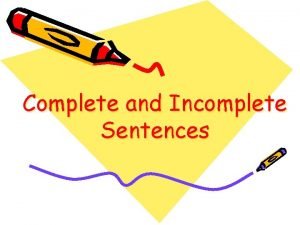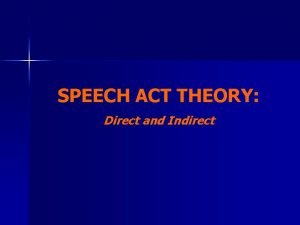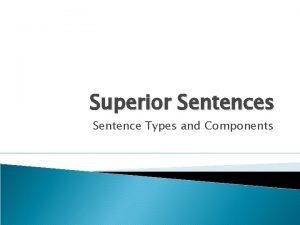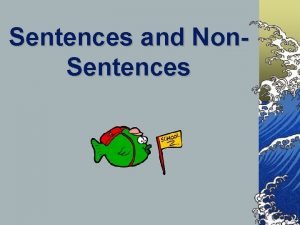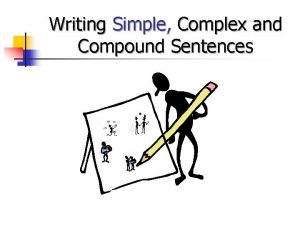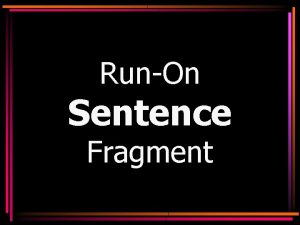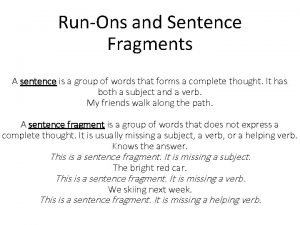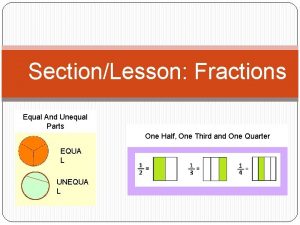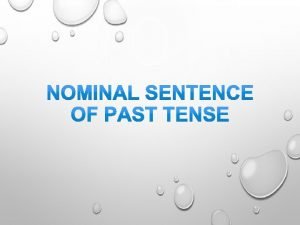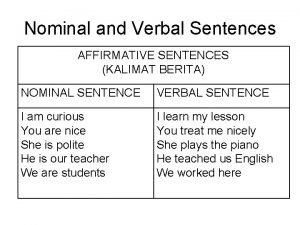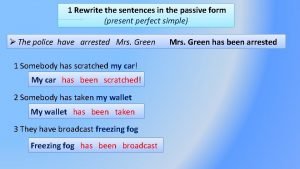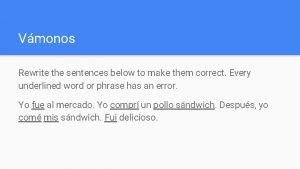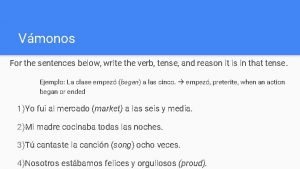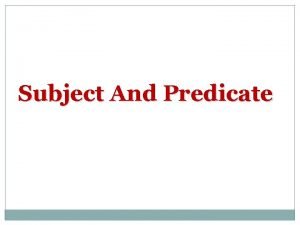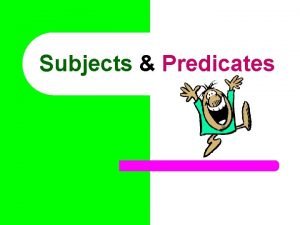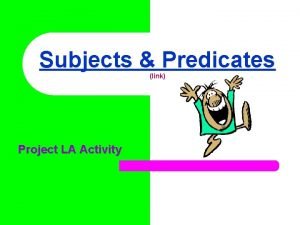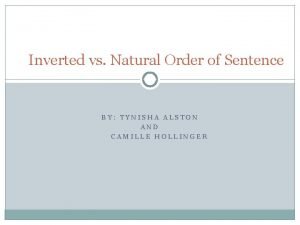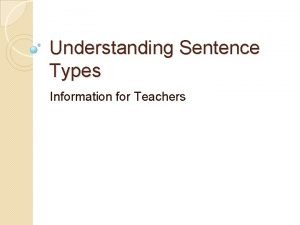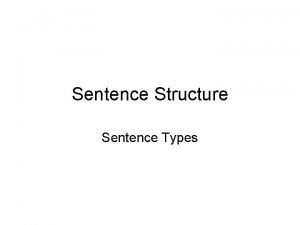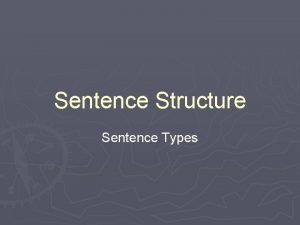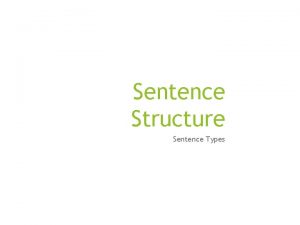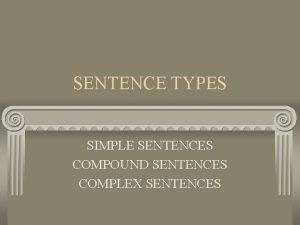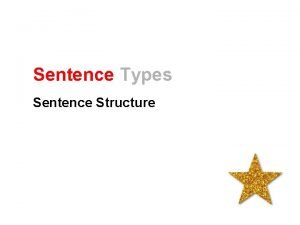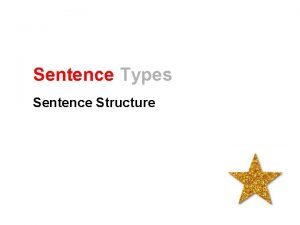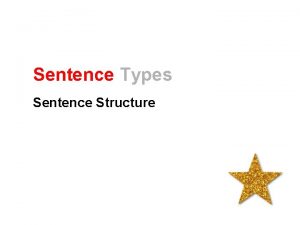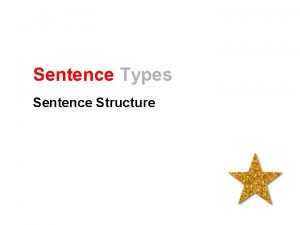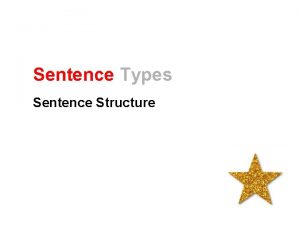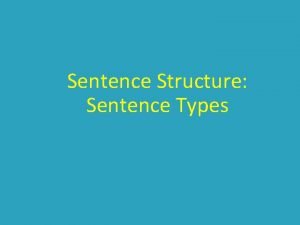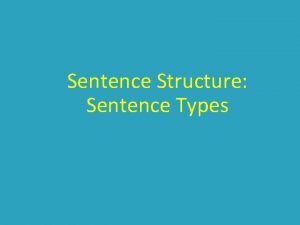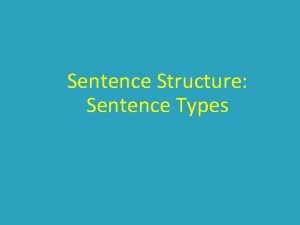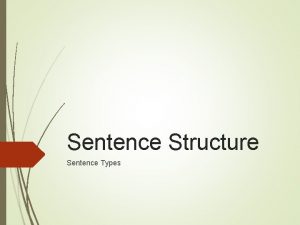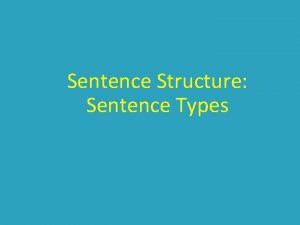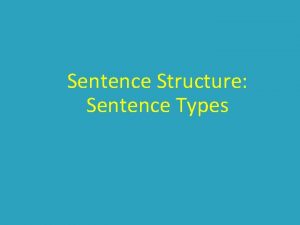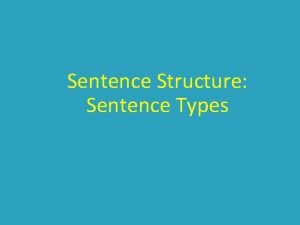Superior Sentences Sentence Types and Components Parts of







![Verbs ◦ Simple [walk, walks] ◦ Perfect [have walked] ◦ Progressive [is walking] 3 Verbs ◦ Simple [walk, walks] ◦ Perfect [have walked] ◦ Progressive [is walking] 3](https://slidetodoc.com/presentation_image_h/0db2dd3d6b27ea2834d201cd617d5372/image-8.jpg)










![Complex Sentences � Have [dependent clause] connected to an independent clause by a comma. Complex Sentences � Have [dependent clause] connected to an independent clause by a comma.](https://slidetodoc.com/presentation_image_h/0db2dd3d6b27ea2834d201cd617d5372/image-19.jpg)


- Slides: 21

Superior Sentences Sentence Types and Components

Parts of Speech (NIPPAVAC) Nouns Interjections Pronouns Preposition Adjectives Verbs Adverbs Conjunctions

Nouns Person ◦ mother ◦ student ◦ baker Place Thing Concept ◦ love ◦ freedom ◦ forgiveness ◦ Formal names of people, buildings, places, events, titles, etc. Paris Dr. Spock ◦ school ◦ hospital ◦ restaurant ◦ cat ◦ book ◦ movie Proper Nouns [capitalize these] Common Nouns ◦ All other nouns Singular (one noun) ◦ ◦ ◦ mother café child fox church ◦ ◦ ◦ mothers cafes children foxes churches Plural (More than one noun)

Interjections Words that show excitement or emotion. Followed by a comma or exclamation point Hey Wow Oh Ah Oops No Hooray Ouch Yikes Yes OMG Etc.

Pronouns Words that stand in for nouns Types of Pronouns Personal Pronouns 3 Voices 2 Forms ◦ First person (I, we) ◦ Second person (you) ◦ Third person (he, she, it, they) ◦ Personal ◦ Singular (I, he, she, it, you) ◦ Demonstrative (This, ◦ Plural (We, they, you) that, these, those) 4 Cases ◦ Indefinite (anyone, ◦ Nominative (Subject case) one, someone, etc. ) ◦ Objective (Object case) ◦ Relative (That, Who , Which) ◦ Possessive (Ownership) ◦ Interrogative (Who, ◦ Reflexive (-self) Which, What) ◦ Reciprocal (Each other, One another)

Prepositions aboard about above across after against along amid among anti around as at before behind below beneath besides between beyond but concerning considering despite down during excepting excluding following for from in inside into like minus near of off on onto opposite outside over past per plus regarding round save since than through to towards underneath unlike until up upon versus via within without

Adjectives Adjective Categories Degrees of Adjectives Words that describe nouns Answers: How many? What kind? Which? Adjective suffixes ◦ ◦ ◦ ◦ -ible, -able -ful -al -ic -ive -less -ous ◦ Determiners (articles and demonstrative pronouns) ◦ Observations ◦ Size sand Shapes ◦ Ages ◦ Colors ◦ Origins ◦ Materials ◦ Qualifiers ◦ Possessives (pronouns) ◦ Articles [a, an, the] ◦ Positive [good] ◦ Comparative [better] ◦ Superlative [best]
![Verbs Simple walk walks Perfect have walked Progressive is walking 3 Verbs ◦ Simple [walk, walks] ◦ Perfect [have walked] ◦ Progressive [is walking] 3](https://slidetodoc.com/presentation_image_h/0db2dd3d6b27ea2834d201cd617d5372/image-8.jpg)
Verbs ◦ Simple [walk, walks] ◦ Perfect [have walked] ◦ Progressive [is walking] 3 types ◦ Active [show action] ◦ Linking [show being] ◦ Helping [show tense] Verb tenses Present ◦ Simple [walked] ◦ Perfect [had walked] ◦ Progressive [was walking] 2 Roles ◦ Transitive (with object) ◦ Intransitive (without object) Past Future ◦ Simple [will walk] ◦ Perfect [will have walked] ◦ Progressive [will be walking]

Adverbs Describe an action or an adjective Answer: How? Where? When? Kinds of adverbs ◦ ◦ ◦ Time [now] Manner [slowly] Place [there] Frequency [often] Purpose [to -] Adverb suffix – ly Degrees of Adverbs ◦ Positive [happily] ◦ Comparative [more happily] ◦ Superlative [most happily]

Conjunctions Connect words, phrases, clauses, and ideas 3 kinds ◦ Coordinating [for, and, nor, but, or, yet, so] ◦ Correlative Subordinating TIME CAUSE + EFFECT OPPOSITION CONDITION after because although if before since though when now that even though as whereas while [both. . . and, not since only. . . but, also, either. . . or, neither. . . nor, until whether. . . or] in order that so while unless only if whether or not even if in case (that)

4 Kinds of Sentences � Declarative – makes a statement ◦ The grass is green. � Interrogative – asks a question ◦ How long is that grass? � Imperative – gives a command ◦ Mow the grass. � Exclamatory – makes an exclamation ◦ I am not mowing the grass no matter what!

Sentence Components: Subject � The subject is the person or thing performing the action in the sentence and all of the words that modify that actor. � The subject controls the agreement of verbs and pronouns. � Nouns, pronouns, and gerunds (-ing verbs acting like nouns) can be subjects. �Wolves eat rabbits. �Swimming is fun. �I am tired today.

Sentence Components: Predicate � The predicate is the action or state of the actor or subject of the sentence. � Objects and verbs (and any phrases describing them) together make up the predicate. �Wolves eat rabbits. �Swimming is fun. �I am tired today.

Sentence Components: Objects/Predicate Nominative and Adjective Direct Object The thing receiving the action ◦ In sentences with linking verbs ◦ The car hit the tree. ◦ I baked a cake. Indirect Object To or for whom the action is done ◦ I baked my dad a cake. Predicate Nominative [noun] Dad is home. Predicate Adjective ◦ In sentences with linking verbs Dad is happy.

Sentence Components: Phrases � Prepositional Phrases [begin with a preposition and end in a noun, may modify the subject or the predicate. ] �(In the beginning), one (of my ancestors) was the Shaman (of the tribe). � Adverbial Phrases [modify a verb] � Adjective Phrases [modify a noun] ◦ The rain dripped (in a fretful pattern) [all day]. ◦ [The sometimes-mysterious] girl became my friend.

Sentence Components: Clauses All clauses have a subject and a predicate Independent Clauses ◦ Could stand alone as a sentence or be combined with other clauses. Dependent Clauses Because I love ice cream [Dependent] Cats can scream loudly [Independent] While the dogs barked [Dependent] When the wind blows [Dependent] ◦ Begin with a The storm rages [Independent] subordinating conjunction, so they cannot stand alone as a sentence.

Simple Sentences � Have one subject and one predicate ◦ Wild horses have been seen on that island. � Sometimes parts) the predicate is compound (in 2 ◦ The wild horses on the island roam free and live happy, albeit difficult, lives. � Sometimes parts) the subject is compound (in 2 ◦ The wild horses and cougars lived peacefully together.

Compound Sentences � Are made up of 2 independent clauses joined by a coordinating conjunction and a comma. � Compound sentences have 2 subjects and 2 predicates ◦ The wild horses nearly starved, but the cougars thrived that winter. ◦ Sometimes I bike to school, and you pass me by on your motorcycle.
![Complex Sentences Have dependent clause connected to an independent clause by a comma Complex Sentences � Have [dependent clause] connected to an independent clause by a comma.](https://slidetodoc.com/presentation_image_h/0db2dd3d6b27ea2834d201cd617d5372/image-19.jpg)
Complex Sentences � Have [dependent clause] connected to an independent clause by a comma. ◦ [After the party ended], my friends spent the night at my house. ◦ The weekend at the lake relaxed me, [although I had to work]. ◦ The kids need to go to bed, [whether or not they want to], no later than 8: 00 p. m.

Compound-Complex Sentences � Have 2 independent clauses and a dependent clause, so there are 3 subject with 3 predicates. ◦ [Though Annie prefers watching mystery films], she rented the latest romantic comedy, and she enjoyed it very much. ◦ Mary forgot her friend's birthday, so she sent her a card [when she finally remembered].

Writing Superior Sentences � Specific subjects � Active verbs (predicate) � Vary sentence structures � Avoid wordiness � Avoid vague words
 Major supporting sentences
Major supporting sentences Complete the incomplete sentences
Complete the incomplete sentences What sentences in english
What sentences in english Superior in a sentence
Superior in a sentence Sentences and non sentences
Sentences and non sentences What is compound sentence
What is compound sentence Modifiers
Modifiers Run on fragment
Run on fragment Fragments and run-ons
Fragments and run-ons Fractions equal and unequal parts
Fractions equal and unequal parts Write three positive sentences of nominal sentences
Write three positive sentences of nominal sentences Negative sentence
Negative sentence Rewrite the sentences in passive voice
Rewrite the sentences in passive voice Rewrite the wrong sentences
Rewrite the wrong sentences Write the sentences below in the past simple.
Write the sentences below in the past simple. The dark clouds filled the sky subject and predicate
The dark clouds filled the sky subject and predicate Simple predicates
Simple predicates This sentence contains an example of a my little brothers
This sentence contains an example of a my little brothers What is the complete predicate of the sentence below
What is the complete predicate of the sentence below Natural and inverted
Natural and inverted Assertive sentence and affirmative sentence
Assertive sentence and affirmative sentence Finite verb
Finite verb

